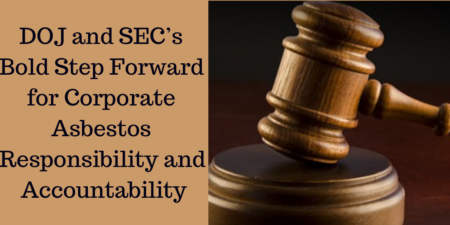Posted on February 22, 2019
For decades, health advocates have been fighting an uphill battle to prevent asbestos-caused diseases. But this week, when, the Department of Justice (DOJ) and the Securities and Exchange Commission (SEC) issued subpoenas to Johnson & Johnson (J&J) regarding the alleged presence of asbestos in their talc and baby powder products, progress was made. The subpoenas represent the first major step taken by the federal government to rein in a decades-long cover-up attempt by the health care conglomerate and a tremendous victory for the asbestos-safety movement worldwide.

The request for documents was joined by Sen. Patty Murray, (D-WA). In a letter to J & J, Sen Murray wrote, “I am troubled by recent reports of an alleged decades-long effort by Johnson & Johnson to potentially mislead regulators and consumers about the safety of one of its products, which may have resulted in long-term harm for men, women, and children who used Johnson & Johnson baby powder.”
Here’s what Johnson & Johnson and the asbestos industry doesn’t want you to know:For more than a century, asbestos exposure has been known to cause disease and death and there is no safe level of exposure or controlled use.
Unsealed documents suggest Johnson & Johnson feared asbestos, the primary cause of pleural mesothelioma, was in its talc—including its baby powder—as early as the 1970s. According to FairWarning, an investigative news organization that focuses on public health, consumer, and environmental issues, a 1971 Johnson & Johnson memo stated, “It would seem more than appropriate that we upgrade the quality control on our talc and baby powder, particularly as to the potential asbestos content” (emphasis mine). A 1973 internal report acknowledged the presence of this carcinogen at its Windsor Talc Mine in Vermont. What’s worse is that the company appeared to know safe, non-lethal substitutes for talc were available; the same memo stated, “Corn starch is obviously another answer.”
Mesothelioma is just one of many asbestos-caused diseases, but asbestos also causes lung, ovarian, laryngeal cancers, and respiratory diseases such as asbestosis. From 1999 to 2016, nearly 50,000 Americans died from mesothelioma, 20 percent of them women — the vast majority due to some type of asbestos exposure.
Unfortunately, Johnson & Johnson’s lack of disclosure is not unique. Nearly 40,000 Americans die each year from asbestos-linked diseases, the result of exposure to chemicals and products distributed by American companies, all of whom held to dangerously low standards of transparency.
The EPA continues to balk at banning the deadly chemical. As they delay, public health advocates and states have stepped up to demand action. Last year, a coalition of public health groups filed a formal petition to the EPA calling for more transparency on asbestos imports and use. EPA rejected their petition, which has now been challenged in court.
Then last month, 15 Attorneys General from around the country filed a nearly identical petition with EPA to demand they begin collecting this necessary information.
“At present, the EPA does not possess, and is not collecting… comprehensive data regarding importing, processing and use of asbestos and asbestos-containing articles,” Massachusetts Attorney General Maura Healey said in a press release last month when the petition was filed.
The EPA, the agency charged with protecting the American public from dangerous substances, she said, lacks the “critical information Johnson & Johnson, along with all other commercial importers and users asbestos, should heed these calls for transparency. But without government action, they won’t. They will put profits before public health as they have always done. Johnson & Johnson withheld vital information about the safety of their products for several decades, and, in doing so, endangered the lives of countless parents and children. This is both reckless and fundamentally un-American. It is about time the federal government stands up to corporate negligence. Congress must ban asbestos imports and use. The EPA should be forced to hold these companies responsible, both for their crimes against the American people and for reporting their imports and use. The time to end this man-made disaster is now. Linda Reinstein
